- Home
- Peter Benchley
Beast Page 7
Beast Read online
Page 7
“Wonder why Marcus didn’t see these,” Mike said as he brought the fender aboard. “It’s not like they were underwater.”
“A helicopter is a wonderful contraption, but you got to fly it real slow over open water or you overwhelm the scanners in the human eye.” Darling looked out over the water. There were no signs of life, present or past. “That’s it, then.”
He took a bearing on the dim hump in the distance called Bermuda, and headed for home.
By six o’clock, they had left the deep behind, the ocean swell had faded and the water’s color had changed from blued steel to dark green. From the flying bridge they could see sand holes on the bottom and dark patches of grass and coral.
“Who’s that?” Mike asked, pointing to a boat silhouetted against the lowering sun.
Darling shaded his eyes and looked at the boat, appraising the rake of the bow and the shape of the house and the size of the cockpit.
“Carl Frith,” he said.
“Hell’s he doing? Trolling?”
“In the shallows? Not bloody likely.”
They kept looking. They could see movement aboard the boat, which rolled as if it were taking on a weight and then rolled back as if releasing it.
“You don’t think … ?” Mike began. “Nah, he’s not that stupid.”
“Stupid? Maybe not,” Darling said as he turned toward the boat and pushed his throttle forward. “But how about greedy?”
Mike glanced over at Darling. There was a set to Whip’s jaw, a cold and squinty hardness to his eyes.
Carl Frith had been a trap fisherman, and one of the noisiest protesters when traps were outlawed. He was always bleating about freedom, independence and the rights of man, despite having received over $100,000 from his settlement with the government—enough for any man, Darling thought, enough to let him change over to line fishing or charter fishing or start another business altogether. But it was beginning to look as if Carl Frith wanted to have it both ways.
Because they were approaching from the northwest, upwind, they got to within a hundred yards of Frith before he heard Privateer’s engine. They had a clear view of him reaching underwater with his boat hook and snagging the sunken buoy, pulling the rope up to his winch, hauling the big fish trap aboard his boat, opening the door and emptying the catch into the fish hold.
“Miserable sonofabitch,” Darling said.
“Gonna run him down?”
“Gonna fillet the bastard.”
“Good enough.”
Darling felt a rage rising in the pit of his stomach. He didn’t care that what Frith was doing was illegal: As far as Darling was concerned, most laws were whores assigned to serve politicians. What burned him—outraged him, sickened him—was the mindless selfishness of the man, the headlong rush at destruction and waste. And it wasn’t only that Frith was still trap fishing, he was using submerged buoys so that the marine police wouldn’t see them on the surface. A passing boat might catch the buoy in its propeller and cut it away, or a storm might shift the trap so Frith couldn’t find it. Either way, the trap would be lost on the bottom, where day after day, week after week, it would kill and kill and kill.
Frith heard him coming now. He had a trap hung over the side, and as soon as he turned and saw Privateer bearing down on him, he pulled a knife from a sheath at his belt and cut the rope holding the trap, and the trap splashed into the water and sank away.
Darling kept up speed until he was ten yards from Frith’s small boat, and then he turned sharply and pulled back on the throttle, throwing a wake that slammed into Frith’s boat and staggered the man.
“Hey!” Frith shouted. “What you think you’re doin’?”
Darling let his boat wallow beside Frith’s. He leaned on the railing of the flying bridge and looked down. Frith was in his fifties, big-bellied and bald. His skin was as dark and worn as an old saddle, his teeth yellow from nicotine.
Darling said, “Just come by to see what you’re up to, Carl.”
“None of your concern.”
“Wouldn’t be fishing, would you?”
“Don’t worry about it.”
“Wouldn’t be trap fishing?”
“Piss off, Whip.”
“Let’s see, Carl…” Darling’s smile was icy. “I expect you’re getting mostly … what? … parrotfish and breams. Right?”
Frith said nothing.
Darling turned to Mike. “Have a look, Michael, see what he’s got.”
Mike started down the ladder from the flying bridge. Frith pulled his knife and held it up. “Nobody comes aboard my boat.”
From his perch on the ladder, Mike leaned over and looked down into Frith’s fish hold. Then he looked up at Darling and nodded.
Darling kept smiling and said, “Parrotfish and breams. Gonna cut ‘em up and sell ‘em to the hotels, right, Carl? Sell ‘em as fresh Bermuda fish? Get maybe a couple bucks a pound?”
“You can’t prove anything,” Frith said. He spread his arms and gestured at the empty cockpit. “Traps? Where do you see traps?”
“I don’t have to prove anything, Carl, I’m not gonna report you.”
“Oh.” Frith relaxed. “Well, then …”
Mike looked startled, but he kept quiet.
“You know what parrotfish and breams do, Carl? They eat the algae that grow on the corals, they clean the reefs. Without them, the coral suffocate and die.”
“Come on, Whip … one man, a few traps, don’t make—”
“Sure, Carl.” Darling let his smile fade. “One man who took a hundred thousand dollars from the government and gave his word he’d stop fishing, one man who doesn’t need the money but’s too pigheaded to do anything else, one man who doesn’t give a shit …”
“Hey, fuck you, Whip.”
“No, Carl,” Darling said. “Fuck you.” He spun his wheel to the right and leaned on his throttle, and Privateer jumped ahead and to the right, slamming into Frith’s boat, its steel bow shearing off Frith’s wooden swim step.
Frith screamed, “Hey! Goddam—”
Darling kept turning, his bow pushing Frith’s stern around. Frith ran forward and turned the key and pushed the button to start his engine. The engine coughed, protested, turned over.
Darling reversed his engine, backed around and aimed his bow at Frith’s stern. He struck Frith’s fantail, crushing it.
Then Frith was in gear, pulling away, trying to escape.
Mike climbed the ladder and stood beside Darling on the flying bridge. “Gonna sink him?”
“He’s gonna sink himself.” Darling looked back into the sun: It was still well above the horizon, still a brilliant yellow ball.
Frith fled, heading east. Darling stayed ten yards behind, threatening collision but not forcing it, heading Frith off whenever he tried to turn, pressing him ever eastward.
“I don’t get it,” Mike said.
“You will.”
“You’re driving him to the cut.”
“Not exactly to it.”
Mike thought for a moment, and then he got it, and he smiled.
For five more minutes Darling chased Frith, always checking the sun behind him and the reefs ahead. Then, gently, he pulled back on his throttle. Privateer slowed, and Frith gradually drew away.
Frith looked back and saw that he was gaining. He shouted something that was snatched away by the wind, and he threw Darling the finger.
Darling pulled his throttle back into neutral, and Privateer stopped. “Bye, Carl,” he called. “Have a nice day.” He pointed off the bow. Not five feet away, barely covered by water, was the first of a ragged phalanx of yellow coral heads.
“Think it’ll work?” Mike said. “He knows these reefs.”
“No man knows these reefs, Michael, if he can’t see.”
Carl Frith dodged one coral head, then another.
Take it easy, he told himself. You may only draw three feet, but some of these buggers aren’t a foot deep.
He throttled back, sl
owing down, letting his breath catch up with his heart.
Damn him, the self-righteous bastard. Who was Whip Darling to tell a man how to make a living? Whip wasn’t doing such a good job of it himself, from what he’d heard. You’d think he’d have some sympathy. Parrotfish important? Breams? That was a laugh. They were trash fish, everybody knew that.
Whip was just pissed off ‘cause he hadn’t had any traps to stiff the government for.
Never mind. No problem. Whip had said he wasn’t about to report him, and, whatever else there was about Whip, he was a man of his word. He wanted this to be personal, Frith would keep it personal. He’d go out one day and maybe just cut away Whip’s buoys, all that horseshit he did for the aquarium. Not even man’s work.
Anyway, it was obvious Whip wasn’t too serious, or he would’ve done more than just chase him up into the shallows. No big deal. All he had to do was turn around and …
Frith looked to the west. He couldn’t see anything, just the blinding yellow flashes of the sun on the dappled sea. No definition to the water, no coral heads, nothing. It was like looking at a sheet of tinfoil at high noon.
He realized he was trapped. He couldn’t go eastward because there the coral heads actually broke water. He couldn’t go west because he couldn’t see: Blind, he was guaranteed to tear the bottom out of his boat. And the tide was falling, he remembered that from this morning when he had checked the tide tables to be sure he could find his buoys.
He could wait till sunset—and what? Try it in the dark? Forget it.
He’d have to wait till morning. He’d put his anchor down and wait, have a beer and a sleep and …
But he didn’t dare. If the wind came up, he might be forced to move in the middle of the night. What was the wind supposed to do? He hadn’t bothered to check, it hadn’t seemed important.
He couldn’t see Whip’s boat: It was out there somewhere in the sunlight. He shouted, “God damn you!…”
Darling watched Frith’s boat slow down, then stop. He imagined Frith thinking everything was fine, then turning around and looking into the sun.
“He’ll wait till morning,” Mike said.
“Not Carl. He hasn’t got the patience.”
They stayed for a few more minutes, drifting at the edge of the shallow reef.
“Maybe you’re right,” Darling said, and he reached for his throttle.
Just then, they heard Frith’s engine roar.
“Nope,” Mike said, grinning.
They listened to the sound of the engine across the still water, heard it rev up then die off, advancing and retreating.
“He’s searching,” Darling said. “Like a blind man.”
A moment later they felt a little tremor in their feet, sent by the water through the Privateer’s steel plates, and then they heard a low grinding kind of noise, followed suddenly by the yowl of Frith’s engine.
“He did it,” Darling said, and he laughed and slapped Mike on the shoulder. “Ran himself up on that reef, hard and fast.”
“Want me to call the police?” Mike asked. “They can send the rubber boat.”
“Let him swim. He could use the workout.” Darling turned his boat to the west. “Besides, we got a duty to do.”
“What’s that?”
“Wreck the bastard’s traps.”
“He’ll report us,” Mike said. Then he paused. “No, now I think of it, I don’t guess he will.”
*
By the time Darling rounded the point into Mangrove Bay, the blue of the sky was fast turning violet, and the departed sun had tinted the western clouds the color of salmon.
A single light bulb burned on the dock, and beneath it, moored to a piling, was a white twenty-five-foot outboard motorboat with the word POLICE stenciled on the side in foot-high blue letters.
“Christ,” Mike said, “he’s reported us already.”
“I doubt it,” said Darling. “Carl’s a fool, but he’s not crazy.”
Two young policemen stood on the dock, one white, one black, both wearing uniform shirts, shorts and knee socks. They watched as Darling eased the boat against the dock, and they passed Mike the bow and stern lines.
Darling knew the policemen, had no problem with them—no more than he had with the marine police in general, whom he regarded as ill-trained, under-equipped and overburdened. These two he had taken to sea with him on their days off, had helped them learn to read the reefs, had shown them shortcuts to the few deep-water channels in and out of Bermuda.
Still, he chose to remain on the flying bridge, sensing instinctively that altitude reinforced his authority.
He leaned on the railing and raised a finger and said, “Colin … Barnett …”
“Hey, Whip …” Colin, the white cop, said.
Barnett said, “Come aboard?”
“Come ahead,” said Darling. “What brings you fellas out of a night?”
“Hear you found a raft,” Barnett said.
“True enough.”
Barnett stepped aboard and pointed to the raft lying athwart the cockpit. “That it?”
“That’s the one.”
Barnett shone a flashlight on the raft and leaned down to it. “Lord, it stinks!”
Colin stayed where he was and said hesitantly, “Whip … we gotta take it.”
Darling paused. “Why’s that? Somebody claim to have lost it?”
“No … not exactly.”
“Then it’s mine, isn’t it? … First law of salvage: finders keepers.”
“Well …” Colin seemed uneasy. He looked at his feet. “Not this time.”
“That so.” Darling waited, feeling a roil of anger in his stomach, fighting it down. “What, then?”
“Dr. St. John,“Colin said. “He wants it.”
“Dr. St. John.” Now Darling knew he was bound to lose, and his temper was bound to win. “I see.”
Liam St. John was one of the few men in Bermuda whom Darling took the trouble to loathe. A second-generation Irish immigrant, he had gone away to school in Montana and graduated from some diploma mill that awarded him a doctorate. Exactly what the doctorate was in, nobody knew and he never said. All anybody knew for certain was that little Liam had left Bermuda pronouncing his name “Saint John” and had returned pronouncing it (and insisting everyone else do, too) “SINjin.”
Armed with an alphabet appended to his name, St. John had rallied a few powerful friends of his parents and besieged the government, arguing that certain disciplines, such as maritime history and wildlife management, were being grossly mishandled by amateurs and should be turned over to certified, qualified experts— which meant him, since he was the only status-Bermudian with a doctorate in anything other than medicine. Never mind that his degree was in an unknown field, probably something utterly useless like Druid combs.
The politicians, who were unconcerned with shipwrecks and nettled by loudmouthed fishermen, were pleased to remove both from their agendas, and for Dr. Liam St. John, Ph.D., they created the new position of minister of cultural heritage. They didn’t bother with a precise job description, which suited St. John just fine, for he defined and expanded the job as he went along, assuming more and more authority and enforcing rules and regulations of his own making.
As far as Darling was concerned, all St. John and his regulations had done was turn hundreds of Bermudians into criminals. He had decreed, for example, that no one was permitted to touch any shipwreck without first securing a license from him and agreeing to pay one of his staff two hundred dollars a day to supervise work on the wreck. The result was that nobody ever reported finding anything, and if they did dig up some coins or artifacts, gold earrings or Spanish pottery, they hid them until they could smuggle them out of Bermuda.
Thanks to the minister of cultural heritage, Bermuda’s heritage was being sold in galleries on Madison Avenue in New York.
Scientists who had once regarded Bermuda as a prime deep-water laboratory, a unique speck of land in the mid-Atlantic, no lon
ger bothered to come, because St. John insisted that all discoveries be turned over to and examined by his staff, who prepared papers (always pedestrian, usually erroneous) for him to deliver at academic conclaves.
For almost a year, Darling and his diver friends had fantasized about ways to get rid of St. John. Someone had suggested reporting a shipwreck find and taking St. John to have a look at it and then sinking the boat. (It was said that St. John didn’t know how to swim.) The idea was vetoed, largely on the grounds that St. John would never go himself: He’d send one of his stooges.
Someone else suggested they just kill him—hit him on the head and dump him in the deep. But although everyone agreed that the result was desirable, no one volunteered to do the deed.
Darling wouldn’t have been surprised, however, if it were to happen some night—if St. John were simply to vanish. Nor would he have been crestfallen at the news.
“Colin,” he said, “I want you to do me a favor.”
“Name it.”
“You go back and tell Dr. St. John that I’ll give him the raft… .”
“Okay.”
“… if he’ll come over here himself and let me shove it up his ass.”
“Oh.” Colin looked at Barnett, then at his feet again, then, reluctantly, at Darling. “You know I can’t do that, Whip.”
“Then we got us a problem, don’t we, Colin? ‘Cause there’s something else you can’t do, and that’s take the raft.”
“But we have to!” There was a wailing note in Colin’s voice.
Barnett stepped away from the raft and came forward and stood at the bottom of the ladder, looking up.
As Darling looked down at him, he saw movement in the shadows aft. It was Mike, moving silently toward the rack where they kept the clubs and gaff hooks for subduing big fish.
“Whip,” Barnett said, “you don’t want to do this.”
“That raft is mine, Barnett, and you know it.” Darling wanted to say more, wanted to say that it wasn’t a matter of the raft, wasn’t even just a matter of principle, it was also a matter of the two or three or four thousand dollars, dollars that could make a difference, dollars he was not going to let Liam St. John steal from him. But he said none of it; he was not about to whine to a policeman.

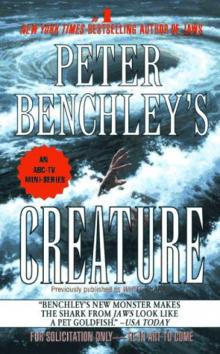 Peter Benchley's Creature
Peter Benchley's Creature The Island
The Island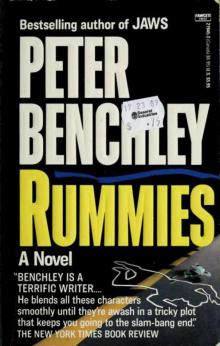 Rummies
Rummies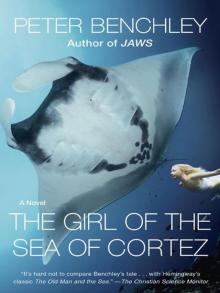 The Girl of the Sea of Cortez: A Novel
The Girl of the Sea of Cortez: A Novel Time and a Ticket
Time and a Ticket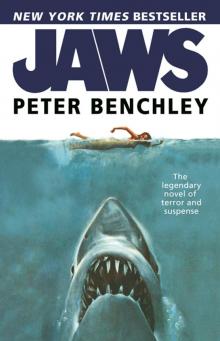 Jaws
Jaws The Deep
The Deep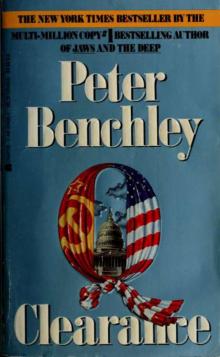 Q Clearance
Q Clearance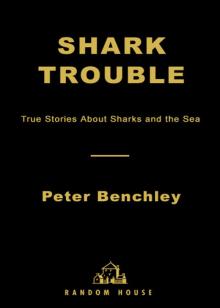 Shark Trouble: True Stories and Lessons About the Sea
Shark Trouble: True Stories and Lessons About the Sea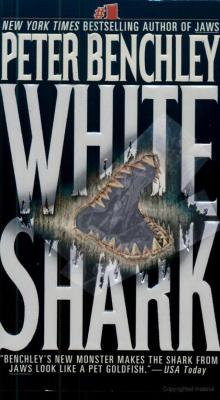 White Shark
White Shark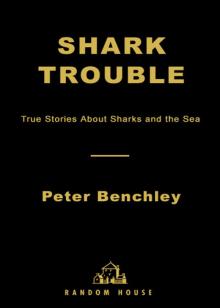 Shark Trouble
Shark Trouble Shark Life: True Stories About Sharks & the Sea
Shark Life: True Stories About Sharks & the Sea